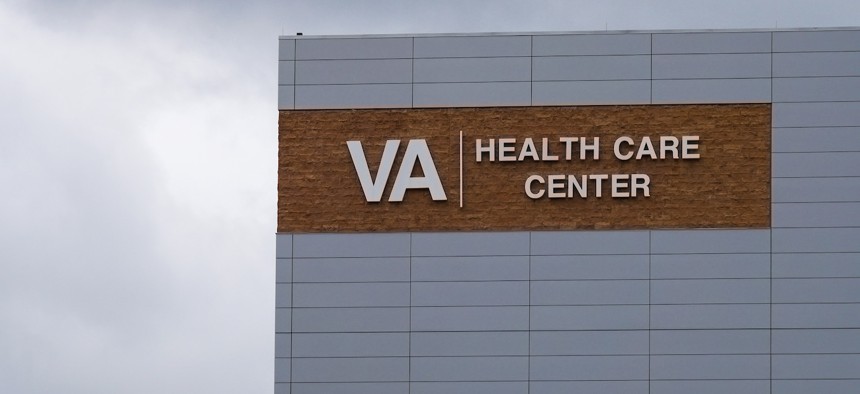
VA officials say the department's screening infrastructure is overwhelmed and under-resourced. Julio Tamayo/Getty Images
VA is putting veterans at risk by improperly screening employees, watchdogs warn
The department does not have a good explanation for why the shortfalls occurred, officials say.
After years of warnings, the Veterans Affairs Department is still not vetting or properly screening many of its employees, the agency and auditors told Congress on Wednesday, putting veterans at an increased risk of harm.
Much of the problem can be traced back to staffing shortages, lawmakers, VA officials and watchdogs said before a panel of the House Veterans Affairs Committee, as the department’s screening infrastructure is overwhelmed and under-resourced. VA maintains a multi-step process to vet employees both before and after their onboarding, but multiple audits have shown those reviews were often delayed or did not occur at all.
VA has more than 12,000 employees with a criminal history related to controlled substances, Seto Bagdoyan, a director at the Government Accountability Office, told the Oversight and Investigations Subcommittee, including 1,800 with felony convictions. Lawmakers highlighted that total as a significant concern, given that many VA employees have access to controlled substances. VA saw 1,400 incidents of controlled substance theft or loss in 2021, accounting for 7% of all such incidents reported to the Drug Enforcement Administration that year.
“Even though there has been a lot of pressure to hire as many VA employees as possible, it is also crucial that the right people care for our veterans so veterans and their family members know they're in safe hands,” said Rep. Jen Kiggans, R-Va., who chairs the panel holding Wednesday’s hearing.
The VA inspector general found in 2018 one-in-eight workers hired by the Veterans Health Administration between 2012 and 2016 did not receive a background check in a timely manner or at all. A recent follow-up report found many of the issues had not been resolved.
“In multiple instances, staff were in position to provide direct patient care without being vetted,” said Shawn Steele, the IG’s Healthcare Infrastructure Division director.
Steele noted VA has agreed to institute improvements aimed at better maintaining data, tracking its background investigations and ensuring its systems can better support the department's needs. VA has created multiple working groups to address its shortfalls and hopes to introduce reforms in early 2024.
Bagdoyan said GAO has been waiting for “eight years and counting” for a formal policy on granting waivers to employees with a criminal drug history. He added the matter posed multiple problems to VA.
“Our bottom line is our findings pose a double risk,” he said. “First harm to veterans care, and also a diversion of controlled substances for illegal purposes.”
The findings generated bipartisan distress in the committee.
“I find the reports that we heard about from OIG and GAO deeply concerning,” said Rep. Chris Papas, D-N.H. “We're talking about a breakdown of basic governance oversight compliance, that is potentially putting veterans at risk.”
Daniel Galik, VA’s executive director for identity, credential and access management, said the department did not have a good explanation for why the gaps had persisted.
“We're trying to improve our oversight and compliance to track those and catch those instances where background investigations maybe were deficient or were not performed for whatever reason,” Galik said. “We don't really have a good foundation as to why they occurred, but we're committed to ensuring that those types of events don't continue to occur.”
Much of the discussion during the hearing circled back to staffing issues, both within the screening personnel and in the rush to fill openings in VA writ large. Steele noted facilities with as many as 4,700 employees had only one adjudicator to review issues flagged during background screenings.
“It seems to me that a common thread and core cause of weaknesses in vetting is staffing,” said Rep. Frank Mrvan, D-Ind., the top Democrat on the panel. “This is a bit circular, but it appears that VA does not have the requisite staffing levels needed to onboard additional staff.”
Mrvan noted authority provided to VA to proceed with parts of the employee background check, such as fingerprinting, added risks to the process.
Jessica Bonjorni, VHA's chief of human capital management, said the department has grown its security staff by 35% over the past year and added human resources personnel to perform compliance duties. She noted it still takes VHA 168 days to hire on average, far short of its stated goal of 80 days.







